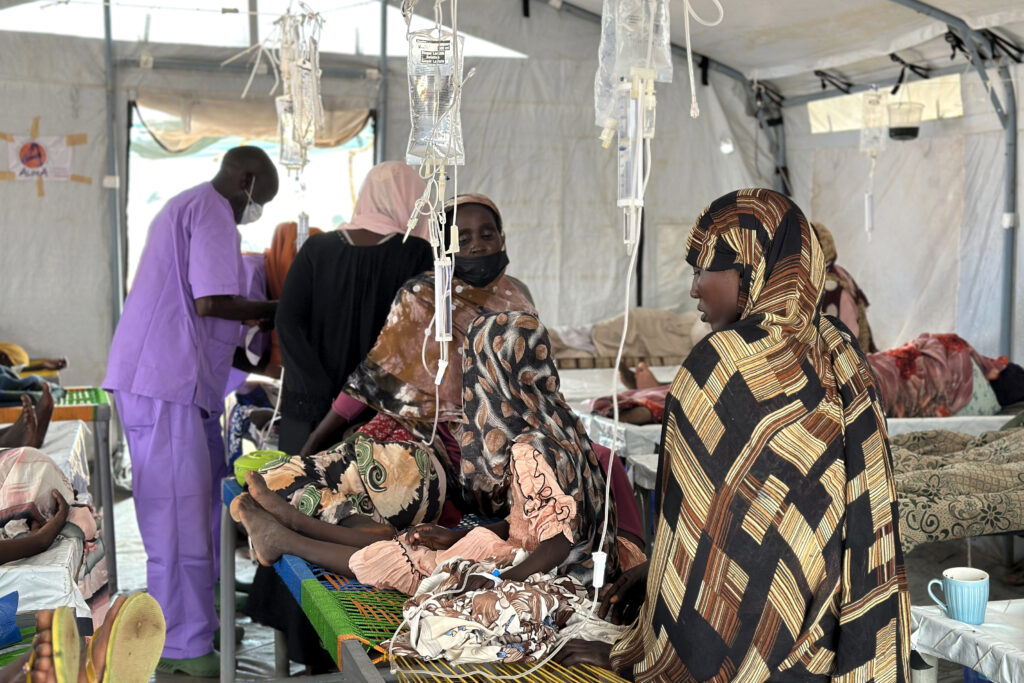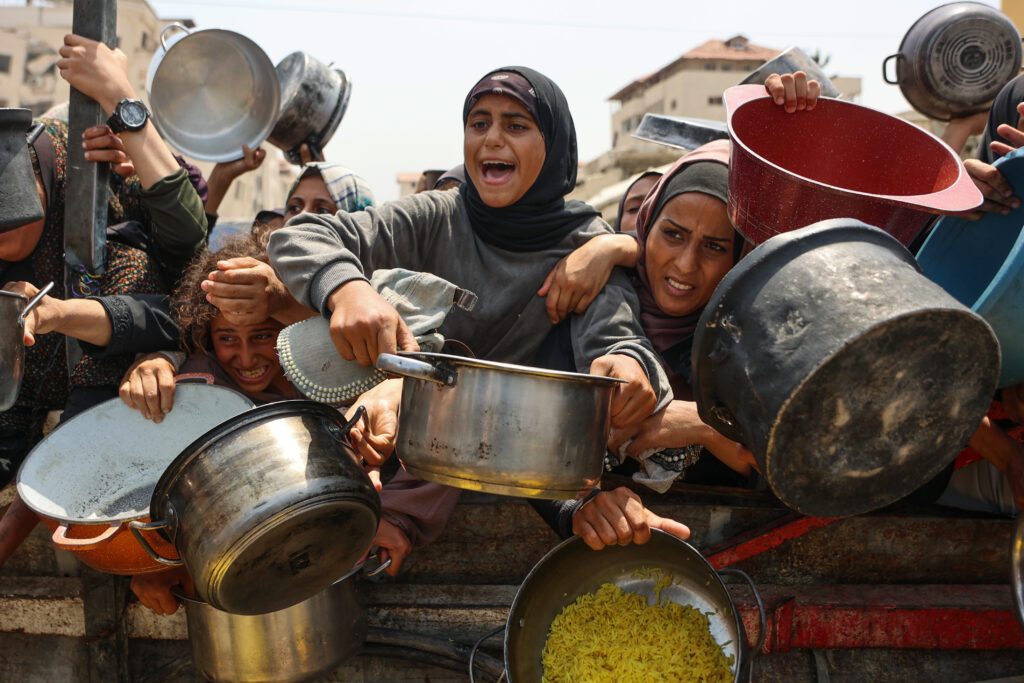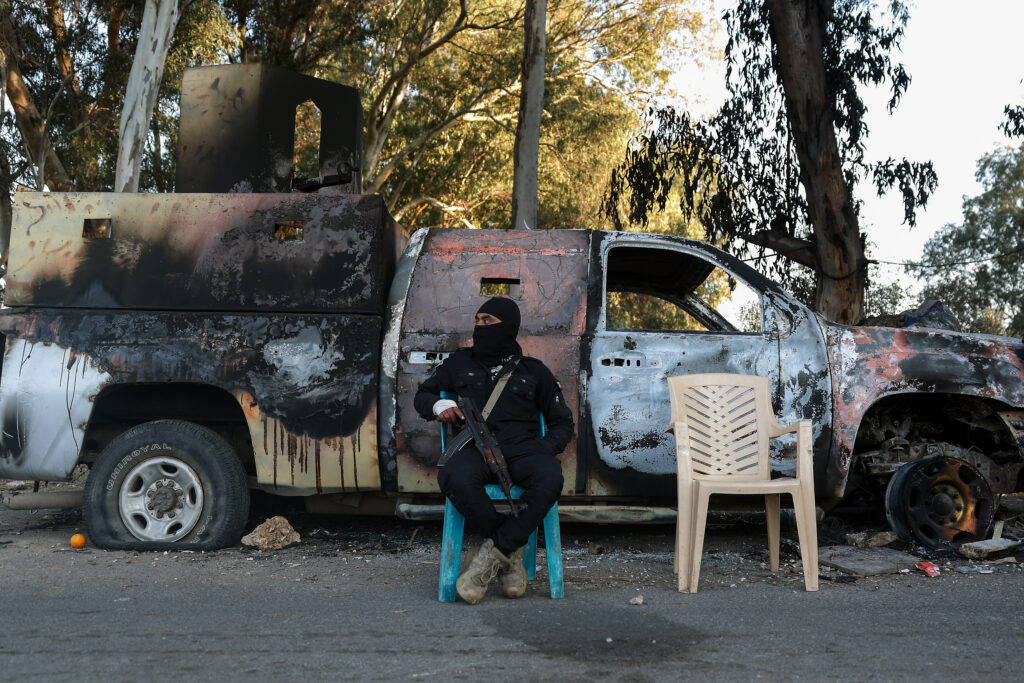AFP Asia Business
At least 40 dead in Sudan’s worst cholera outbreak in years: MSF
Cholera has claimed at least 40 lives in Sudan’s Darfur region over the last week as the country weathers its worst outbreak of the illness in years, Doctors Without Borders (MSF) said on Thursday.The medical charity said the vast western region, which has been a major battleground over more than two years of fighting between the regular army and the paramilitary Rapid Support Forces, had been hardest hit by the year-old outbreak.”On top of an all-out war, people in Sudan are now experiencing the worst cholera outbreak the country has seen in years,” MSF said in a statement. “In the Darfur region alone, MSF teams treated over 2,300 patients and recorded 40 deaths in the past week.”The NGO said 2,470 cholera-related deaths had been reported in the year to August 11, out of 99,700 suspected cases.Cholera is an acute intestinal infection that spreads through food and water contaminated with bacteria, often from faeces.It causes severe diarrhoea, vomiting and muscle cramps.Cholera can kill within hours when not attended to, though it can be treated with simple oral rehydration, and antibiotics for more severe cases.There has been a global increase in cholera cases, which have also spread geographically, since 2021.MSF said mass displacements of civilians sparked by the war in Sudan had aggravated the outbreak by denying people access to clean water for essential hygiene measures, such as washing dishes and food.- No other choice -“The situation is most extreme in Tawila, North Darfur state, where 380,000 people have fled to escape ongoing fighting around the city of El-Fasher, according to the United Nations,” MSF said.”In Tawila, people survive with an average of just three litres of water per day, which is less than half the emergency minimum threshold of 7.5 litres needed per person per day for drinking, cooking, and hygiene.”At a cholera isolation centre in a tent at a Tawila displacement camp, an AFP journalist saw women and a young girl receiving intravenous fluids, while around them exhausted and weak patients were sprawled out on camp beds.”We mix lemon in the water when we have it and drink it as medicine,” said Mona Ibrahim, who has been living for two months in a hastily-erected camp in Tawila.”We have no other choice,” she said. “We don’t have toilets — the children relieve themselves in the open,” she added.According to the World Health Organization, between January of 2023 and July of this year, Sudan had the highest number of cholera deaths of any country in the world.Sudan’s mortality rate from cholera, at 2.1 percent, is more than 2.5 times higher than the global average.- Contaminated water -Since forces loyal to the regular army recaptured the capital Khartoum in March, fighting has again focused on Darfur, where the paramilitaries have been attempting to take El-Fasher.The besieged pocket is the last major city in the western region still under the army’s control and UN agencies have spoken of appalling conditions for the remaining civilians trapped inside.”In displacement and refugee camps, families often have no choice but to drink from contaminated sources and many contract cholera,” said Sylvain Penicaud, MSF project coordinator in Tawila.”Just two weeks ago, a body was found in a well inside one of the camps. It was removed, but within two days, people were forced to drink from that same water again.”MSF said that heavy rains were worsening the crisis by contaminating water and damaging sewage systems, while the exodus of civilians seeking refuge was spreading the disease.”As people move around to flee fighting, cholera is spreading further, in Sudan and into neighbouring Chad and South Sudan,” it said.MSF’s head of mission in Sudan, Tuna Turkmen, said the situation was “beyond urgent”.”The outbreak is spreading well beyond displacement camps now, into multiple localities across Darfur states and beyond,” he said.”Survivors of war must not be left to die from a preventable disease.”
Foreign NGOs say new Israeli rules keep them from delivering Gaza aid
New Israeli legislation regulating foreign aid groups has increasingly been used to deny their requests to bring supplies into Gaza, a joint letter signed by more than 100 groups said Thursday.Ties between foreign-backed aid groups and the Israeli government have long been tense, with Israeli officials often complaining that the organisations are biased. Those rocky relations have become even more strained since Hamas’s October 2023 attack on Israel triggered the Gaza war. “Israeli authorities have rejected requests from dozens of NGOs to bring in lifesaving goods, citing that these organisations are ‘not authorised to deliver aid’,” the aid groups said.COGAT, the Israeli defence ministry body overseeing civil affairs in the Palestinian territories, rejected what it called “false claims” made by the organisations. According to the joint letter, whose signatories include Oxfam and Doctors Without Borders (MSF), at least 60 requests to bring aid into Gaza were rejected in July alone.UK-based Oxfam said that $2.5 million worth of its supplies, including food, were barred from entering Gaza, while another charity, CARE, said it had not been authorised to bring in aid since March.Another signatory, Anera, said it had over seven million dollars’ worth of supplies, including enough rice for six million meals, waiting just outside Gaza in the Israeli port city of Ashdod.But COGAT denied Israel was blocking supplies.”Israel acts to allow and facilitate the entry of humanitarian aid into the Gaza Strip, while Hamas seeks to exploit the aid to strengthen its military capabilities and consolidate its control over the population,” it wrote on X.”This is sometimes done under the cover of certain international aid organisations, whether knowingly or unknowingly,” added COGAT, which said that close to 380 trucks had entered the Gaza Strip on Wednesday.- ‘Hostile activity’ -But Amjad Al-Shawa, head of the Palestinian NGOs Network in Gaza, told AFP that Israel “continues to prevent international NGOs from bringing their trucks” into the territory.”The number of trucks entering Gaza (each day) is only between 70 and 90 at best,” he said.In March, the Israeli government approved a new set of rules for foreign non-governmental organisations working with Palestinians.The law updates the framework for how aid groups must register to maintain their status within Israel.Registration can be refused if Israeli authorities deem that a group denies the democratic character of Israel or “promotes delegitimisation campaigns” against the country.”Unfortunately, many aid organisations serve as a cover for hostile and sometimes violent activity,” said Diaspora Minister Amichai Chikli, whose ministry has been put in charge of NGO registrations.”Organisations that have no connection to hostile or violent activity and no ties to the boycott movement will be granted permission to operate,” he added.- Deadly distributions -The aid groups complained that the new rules were leaving Gazans without life-saving assistance.”Today, international NGOs’ fears have proven true: the registration system is now being used to further block aid and deny food and medicine in the midst of the worst-case scenario of famine”, their joint letter concluded.”Our mandate is to save lives but due to the registration restrictions, civilians are being left without the food, medicine and protection they urgently need,” said Jolien Veldwijk, Palestinian territories director for CARE.Israel has long accused Hamas of diverting aid entering the territory under the UN-led distribution system.Since May, it has distributed aid through the US-backed Gaza Humanitarian Foundation, an organisation that is boycotted by the UN and other aid groups over accusations it serves Israeli military objectives.According to Gaza’s civil defence agency, the GHF’s operations have been frequently marred by chaos as thousands of Gazans have scrambled daily to approach its hubs, where some have been shot, including by Israeli soldiers.In late July, the United Nations reported that at least 1,373 Palestinians had been killed in Gaza since May 27 while waiting or searching for aid.International NGOs now fear they could be barred from operating in Israel and the Palestinian territories altogether if they do not submit sensitive information about their Palestinian staff to the Israeli government.The deadline for information submission is in September, at which point “many could be forced to halt operations in Gaza and the West Bank, including east Jerusalem, and remove all international staff within 60 days.”
India and China eye resumption of border trade
India and China are discussing resuming border trade five years after it was halted, foreign ministry officials on both sides have said, as US tariffs disrupt the global trade order.Past trade between the neighbours across the icy and high-altitude Himalayan border passes was usually small in volume, but any resumption is significant for its symbolism.The …
UN commission finds violence against Syria Alawites likely included ‘war crimes’
A UN commission investigating sectarian bloodshed in Syria’s Alawite heartland documented systematic violence at the hands of government forces and allied groups, warning Thursday that some of the acts could constitute war crimes.The violence in March unfolded along Syria’s predominantly Alawite Mediterranean coast, where security personnel and their allies were accused of carrying out summary executions, mostly targeting civilians from the religious minority, with a war monitor saying more than 1,700 people were killed.The Syrian foreign ministry said it was committed to “incorporating the (commission’s) recommendations into the ongoing process of institution-building” and of consolidating the rule of law.The UN commission said in its report on Thursday that the violence committed by “members of the interim government forces and private individuals operating alongside or in proximity to them… followed a systematic pattern across multiple, widespread locations”.”The violations included acts that likely amount to war crimes,” it said. The commission documented cases of “murder, torture and inhumane acts related to the treatment of the dead, widespread looting and burning of homes all of which displaced tens of thousands of civilians”.Syria’s new authorities have accused gunmen loyal to ousted ruler Bashar al-Assad of instigating the violence by launching deadly attacks that killed dozens of security personnel. The UN commission also found that pro-Assad forces were implicated in the violence.- ‘Deeply disturbing’ -Human rights groups and international organisations have said entire families were killed, including women, children and the elderly.Gunmen stormed homes and asked residents whether they were Alawite or Sunni before killing or sparing them, they said.The UN commission documented similar cases involving the killing of Alawite men.During his rule, Assad — himself an Alawite — cultivated an image as a defender of minorities, even as his authoritarian tendencies plunged the country into civil war.Since his December ouster at the hands of Islamist-led rebels, the violence on the coast and in south Syria’s Druze heartland have raised questions about the new authorities’ ability to provide security and manage sectarian tensions.The UN commission — which said it had been granted “unfettered access” to the area by the post-Assad government — based its findings on more than 200 interviews with victims and witnesses.It said there were “reasonable grounds to believe” that members of the security forces and other private individuals engaged in “serious violations of international human rights law”.”The scale and brutality of the violence documented in our report is deeply disturbing,” said commission chair Paulo Sergio Pinheiro, urging accountability and expanded efforts to arrest perpetrators. – ‘Serious note’ -The commission said it “continues to receive information about ongoing violations in many of the affected areas, including abductions of women, arbitrary arrests and enforced disappearances”.It said it had “found no evidence of a governmental policy or plan” to carry out the attacks, though their systematic nature “in certain locations may be indicative of an organisational policy within certain factions or groups”.In a letter to the commission, Foreign Minister Asaad al-Shaibani said the government took “serious note of the alleged violations”, saying they “appear to be consistent with the findings” of the Syrian inquiry.US envoy for Syria Thomas Barrack called the report “a serious step towards definable and traceable metrics to the Syrian government’s responsibility, transparency and accountability”. The commission said it was also investigating recent violence in Syria’s Druze-majority Sweida province that it said highlighted the urgency of implementing the report’s recommendations.In its own inquiry, the committee formed by the Syrian authorities documented “serious violations against civilians” in March.The committee confirmed “the names of 1,426 dead, including 90 women”, and identified “298 individuals by name” who were suspected of involvement in the violations.
Foreign NGOs say new Israeli rules keep them from delivering Gaza aid
New Israeli legislation regulating foreign aid groups has been increasingly used to deny their requests to bring supplies into Gaza, a joint letter signed by more than 100 groups said Thursday.Ties between foreign-backed aid groups and the Israeli government have long been beset by tensions, with officials often complaining the organisations are biased. The rocky relations have become even more strained since Hamas’s October 2023 attack on Israel triggered the Gaza war. “Israeli authorities have rejected requests from dozens of NGOs to bring in lifesaving goods, citing that these organisations are ‘not authorised to deliver aid’,” the aid groups said.According to the letter, whose signatories include Oxfam and Doctors Without Borders (MSF), at least 60 requests to bring aid into Gaza were rejected in July alone.UK-based Oxfam said that $2.5 million worth of its supplies, including food, were barred from entering Gaza, while another charity, CARE, said it had not been authorised to bring in aid since March.Another signatory, Anera, said it had millions of dollars’ worth of supplies waiting just outside Gaza, in the Israeli port city of Ashdod.“Anera has over $7 million worth of lifesaving supplies ready to enter Gaza – including 744 tons of rice, enough for six million meals, blocked in Ashdod just kilometres away,” CEO Sean Carroll said in the joint letter.In March, the Israeli government approved a new set of rules for foreign non-governmental organisations working with Palestinians.The law updates the framework for how aid groups must register to maintain their status within Israel, along with provisions that outline how their applications can be denied or registration revoked.Registration can be refused if Israeli authorities deem that a group denies the democratic character of Israel or “promotes delegitimisation campaigns” against the country.”Unfortunately, many aid organisations serve as a cover for hostile and sometimes violent activity,” said Diaspora Minister Amichai Chikli, whose ministry has been put in charge of NGO registrations.”Organisations that have no connection to hostile or violent activity and no ties to the boycott movement will be granted permission to operate,” he added.- Deadly distributions -The aid groups complained the new rules were leaving Gazans without life-saving assistance.”Today, international NGOs’ fears have proven true: the registration system is now being used to further block aid and deny food and medicine in the midst of the worst-case scenario of famine”, their joint letter concluded.”Our mandate is to save lives but due to the registration restrictions, civilians are being left without the food, medicine and protection they urgently need,” said Jolien Veldwijk, Palestinian territories director for CARE.Israel has long accused Hamas of diverting aid entering the territory under the longstanding UN-led distribution system.Since May, it has distributed aid through the US-backed Gaza Humanitarian Foundation, an organisation that is boycotted by the United Nations and other aid groups for serving Israeli military objectives.According to Gaza’s civil defence agency, the GHF’s operations have been frequently marred by chaos as thousands of Gazans have scrambled daily to approach its hubs, where some have been shot, including by Israeli soldiers.In late July, the United Nations reported that at least 1,373 Palestinians had been killed in Gaza since May 27 while awaiting or searching for aid.International NGOs now fear they could be barred from operating in Israel and the Palestinian territories altogether if they do not submit sensitive information about their Palestinian staff to the Israeli government.The deadline for information submission is in September, at which point “many could be forced to halt operations in Gaza and the West Bank, including east Jerusalem, and remove all international staff within 60 days.”




